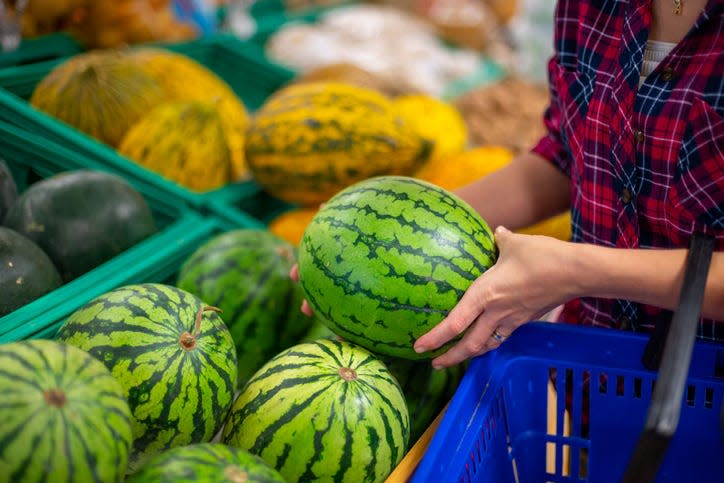Fact check: No health risk associated with eating seedless watermelons

The claim: Eating seedless watermelons treated with colchicine can cause cancer, infertility and more
Social media users are warning against the purported dangers of seedless watermelon.
"Eating seedless watermelon treated with colchicine can cause cancers, severe liver and kidney issues and infertility and birth defects," reads the caption of a Sept. 7 Instagram post. "Eat ONLY BLACK seeded watermelon."
The post features a screenshot of a Google search result explaining that seedless watermelons are bred with the use of the chemical colchicine, which came from a North Carolina State University page.
Follow us on Facebook! Like our page to get updates throughout the day on our latest debunks
The post garnered more than 600 likes in its first week. The same user posted the claim on Facebook, where it garnered more than 100 shares in its first week.
The claim is false. Experts say there are no known safety risks associated with eating seedless watermelons. And the watermelon sold in stores are many generations removed from anything that was directly treated with colchicine.
USA TODAY reached out to the user who shared the post for comment.
Chemical not used directly on watermelons bought in stores
Seedless watermelon plants can be created by crossing a normal watermelon with one that has been treated with the chemical colchicine, according to the University of Florida Institute of Food and Agricultural Sciences. The chemical doubles the chromosomes in the watermelon and helps produce a plant that, when pollinated, develops seedless watermelons.
But that's only the first step in a lengthy process.
"The seedless watermelons we eat never received the colchicine treatment as they are many generations later than the initial seedless watermelon," Dr. Brian Leyland-Jones, chief medical officer for the National Foundation for Cancer Research, said in an email.
And not all seedless watermelons are created using colchicine. Rebecca Wente-Naylor, a breeding trial specialist with Syngenta Vegetable Seeds, said the company uses traditional breeding techniques rather than colchicine to develop male and female lines separately.
"On average, it takes six to eight years to produce a seedless watermelon," Wente-Naylor said in an email. This factors in 10 generations to produce the female parent, six generations to produce the male parent, and another five to eight generations of advanced testing in several environments."
Colchicine is FDA-approved
Officials say there is no evidence of health concerns with seedless watermelon.
"The FDA is not aware of any safety issues with commercially-bred seedless watermelon," an FDA spokesperson told USA TODAY.
Colchicine is also a Food and Drug Administration-approved treatment for acute gout flares.
Fact check: Experts say rubbing orange peels on teeth does more harm than good
Leyland-Jones said the cancer foundation has not observed any link between seedless watermelons and cancer. He said the opposite is actually true.
"Watermelon, seedless – with white seeds – or with black seeds, is a healthy fruit containing the carotenoid, lycopene," he told USA TODAY. "In our body, lycopene deactivates reactive oxygen or free radicals, which play a significant role in initiating the malignant transformation of cells."
Lycopene is an antioxidant and "anti-cancer nutrient," and antioxidants can help prevent illnesses like diabetes and heart disease, according to the National Foundation for Cancer Research.
Our rating: False
Based on our research, we rate FALSE the claim that eating seedless watermelons treated with colchicine can cause cancer, liver and kidney disease, infertility and birth defects. Experts from the FDA and the National Foundation for Cancer Research said seedless watermelons are safe to eat.
Our fact-check sources:
FDA, July 10, 2015, Colchicine (marketed as Colcrys) Information
North Carolina State University, July 20, 2012, What’s the Deal With Seedless Watermelons?
The National Foundation for Cancer Research, July 14, 2021, Cancer-Fighting Food: Watermelon
The journal Rhuematology, Sept. 23, 2017, Use of colchicine in pregnancy: a systematic review and meta-analysis
FDA spokesperson, Sept. 12, Email exchange with USA TODAY
Brian Leyland-Jones, Sept. 13, Email exchange with USA TODAY
Rebecca Wente-Naylor, Sept. 22, Email exchange with USA TODAY
Thank you for supporting our journalism. You can subscribe to our print edition, ad-free app or electronic newspaper replica here.
Our fact-check work is supported in part by a grant from Facebook.
This article originally appeared on USA TODAY: Fact check: False claim that eating seedless watermelon causes cancer

 money
money 